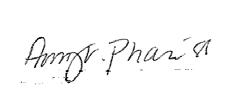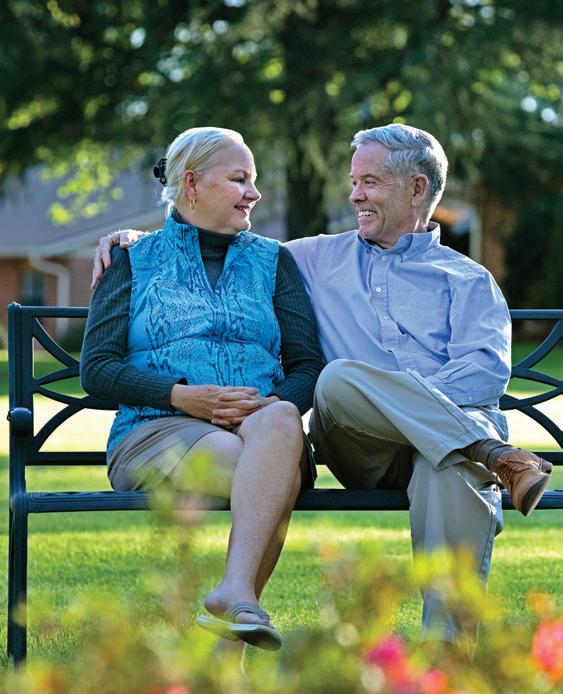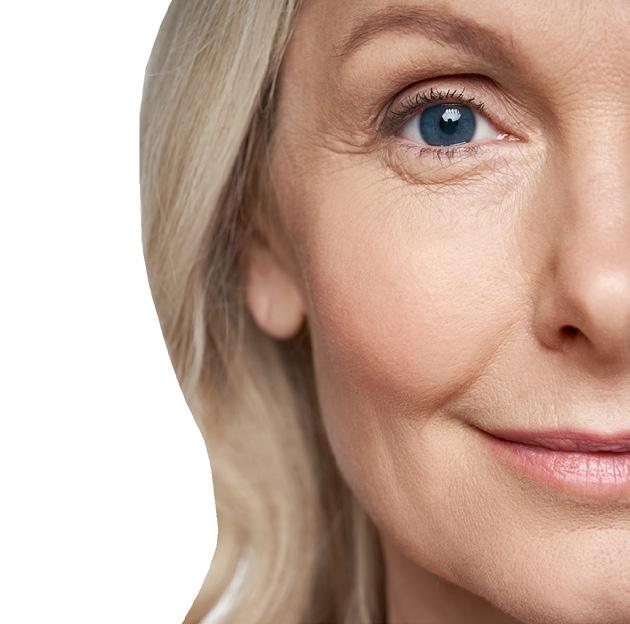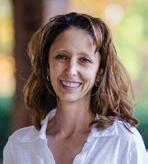F E B R U A R Y 2 0 2 3
Spiritual Caregiving & Dementia: Interview with Colette Bachand
Several years ago, I had the pleasure of meeting Reverend Colette Bachand. Bachand had just moved to Moore County to serve as the chaplain for Penick Village here in Southern Pines. I learned she had written a book on spiritual caregiving, a term entirely new to me, and took a copy home with me. As I considered the importance of caregiving for this month’s issue, I remembered passages from Bachand’s book.
Do This, Remembering Me: The Spiritual Care of Those with Alzheimer’s and Dementia, is a collection of insights, stories and lessons from her experience working with families supporting loved ones with dementia as well as those living with dementia. Colette also writes about her experience caring for her father who lived with dementia. The editor in me wants to correct the previous sentence, in which I use ‘Colette’ rather than Bachand. Technically, I should be consistent using the Reverend’s last name, but I think the “error” speaks to the impact of Colette’s book. It’s personal. By the end, the reader has been on the journey with Colette down the halls of care communities, by bedsides and alongside her father in a straw hat adorned with flowers. We learn how to care for those we love through Colette’s wisdom and insight but, most importantly, through her willingness to share herself and her own experiences caring for others.
We thank Colette for her willingness to share even more with ONC and our readers.
continued on page 6
ASK THE EXPERT: HELPING HANDS
EYE HEALTH: 7 TIPS FOR HEALTHY EYES
FEATURE: SPIRITUAL CAREGIVING & DEMENTIA

CARE GIVING: CARE PART ner HEALTH TIPS
RECIPE: SLOW COOKER CHICKEN & RICE
FEBRUARY 2023 - 1
February is here, and 2023 is now in full swing. The days are getting longer; the sun is a bit brighter. It’s the month of love, which means we are all happily eating chocolate and tossing rose petals throughout the house. Wait, that was the Hallmark movie from last week.
OCTOBER 2022 - 2
OCTOBER 2022 - 2
Back to reality.
Don’t worry. It was decaf.
This month, ONC celebrates 13 years in publication. What a lovely ride it has been. We have shared with the community, learned heaps ourselves and been blessed to have a bevy of experts willing to provide free wisdom and resources for our readers. Here’s to another 13 years and counting. Thank you all for reading and riding along!
Well, it’s official: fall is here. I had my first pumpkin-spiced latte ture dipped low enough to merit a fleece.
Don’t worry. It was decaf.
The Spiritual Care of Those with Alzheimer’s and Dementia. Bachand offers insight and wisdom from her many years working with families and loved ones living with dementia. Perhaps what Bachand offers most is hope for better communication, connection and quality of life for caregivers, care providers and the people who support them both.
Well, it’s official: fall is here. I had my first pumpkin-spiced latte just two days ago, as the evening temperature dipped low enough to merit a fleece.
October is a gentle month. There are constant reminders of change. we are lucky, toward each other. We have lingering conversations the flames flicker. Smoke dances around us in a circle. We zip our
October is a gentle month. There are constant reminders of change. We turn inward, toward warmth and we are lucky, toward each other. We have lingering conversations over tea. We burn fires and sit in silence the flames flicker. Smoke dances around us in a circle. We zip our jackets and consider hats.
February 17 is National Caregivers Day. This means we celebrate, honor and acknowledge all of the caregivers in our lives – the paid ones, the unpaid ones, the family members, the friends…all of the people who manage medication, get us to doctor’s appointments, bundle us in blankets on chilly days and pray with us into the night. Whether you give care, receive care or both, this ONC issue is for you.
In this month’s feature, we’re starting an important conversation: care community for ourselves or a loved one? Fox Hollow Senior Robin Hutchings offers inside perspective for making this decision.
Carolina Eye Associates of Pinehurst offers readers a quick list of tips for healthy eyes at any and every age. I was so surprised by some of the tips, I emailed their office and asked for more! Fingers crossed they keep us in-the-loop in coming months.

In this month’s feature, we’re starting an important conversation: how do we choose the proper senior care community for ourselves or a loved one? Fox Hollow Senior Living’s Sales and Marketing Director, Robin Hutchings offers inside perspective for making this decision.
In Ask the Expert, Amy Natt answers a reader’s question regarding away without any estate planning. Without a will or access to important
Physical therapist Dr. Sara Morrison of Total Body Therapy and potential diagnostic tools used in physical therapy to help diagnose these tools differ from what other doctor’s offices may offer.
In Ask the Expert, Amy Natt answers a reader’s question regarding what to do when a loved one passes away without any estate planning. Without a will or access to important accounts, what does a family do?
Finally, AOS’s Amy Natt answers a reader’s question regarding when and how to help an aging neighbor in this month’s Ask the Expert. Natt provides specific recommendations and an excellent analysis of good boundary management when it comes to helping and relationships.

Physical therapist Dr. Sara Morrison of Total Body Therapy and Wellness helps readers understand potential diagnostic tools used in physical therapy to help diagnose and treat pain. You’ll want to learn how these tools differ from what other doctor’s offices may offer.
Speech Language Pathologist and Health Coach Abbe Simon offers health tips and advice for caregivers, who need to care for themselves as much as caring for others. Health and wellness often get missed with limited time and resources, and Simon provides useful tips all of us can benefit from.
For all of us who have either cared for another or have been cared for by another, Mother Teresa’s words resonate:
I’m going to agree with Nathaniel Hawthorne this month, who
I cannot endure to waste anything so precious as autumnal sunshine spent almost all the daylight hours in the open air.
I’m going to agree with Nathaniel Hawthorne this month, who wrote:
Here’s to enjoying the October sunshine, falling leaves and daylight
I cannot endure to waste anything so precious as autumnal sunshine by staying in the house. So I have spent almost all the daylight hours in the open air.
Here’s to enjoying the October sunshine, falling leaves and daylight hours.
Author and chaplain Colette Bachand graciously allowed ONC to interview her regarding the book she’s authored entitled Do This, Remembering Me:
facebook.com/agingoutreach/ instagram.com/agingoutreachservices/
2 - FEBRUARY
2023
“It is not how much you do, but how much love you put in the doing.”
LETTER
THE
FROM
EDITOR
Amy Phariss, Editor-in-Chief , OutreachNC | editor@outreachnc.com We are passionate The in Aging Well Experts
LETTER FROM THE EDITOR facebook.com/agingoutreach/ instagram.com/agingoutreachservices/ Amy Phariss, Editor-in-Chief , OutreachNC | editor@outreachnc.com We are passionate about helping older adults navigate the many challenges of aging. 910.692.0683 AOSNC.com The in Aging Well Experts Age the Way You Choose LETTER FROM THE EDITOR Amy Phariss, Editor-in-Chief, OutreachNC | editor@outreachnc.com We are passionate about helping older adults navigate the ma challenges of aging. 910.692.0683 AOSNC.com in Aging Well Experts Age the Way You Choose WE CAN HELP YOU























OCTOBER 2022 in teleconference calls or webinars by reading live captions on their laptop, mobile device or tablet. To inquire, contact kim.m.calabretta@t-mobile.com or visit relaync.com/rcc Accessible ALZHEIMER’S HOME THERAPY CONTACT US TODAY FOR A FREE CONSULTATION 779-ALZ-HOPE (259-4673) KSZUCH@ALZHOMETHERAPY.COM WWW.ALZHOMETHERAPY.COM THERAPEUTIC COMPONENTS: Physical Activity Sensory Therapy A Life Plan Community offered by Liberty Senior Living © 2022 Quail Haven Village SCAN HERE 155 BLAKE BLVD., PINEHURST, NC 28374 QUAILHAVENVILLAGE.COM DON’T JUST LIVE HERE... LOVE IT HERE. LIVE at Quail Haven, a Senior Living Community, and... LOVE the picturesque location conveniently close to the Village of Pinehurst LOVE the INSPIRE wellness program that helps promote an active lifestyle LOVE the newly renovated garden apartment homes LOVE the continuing care on-site to provide peace of mind Call 910.537.6812 to schedule a tour and see why residents don’t just live here, they LOVE IT HERE. LIMITED AVAILABILITY! Become a Priority Partner Today! 122162 quail haven love it here couple on bench ad update-outreach nc.indd 1 9/13/22 2:03 PM Tyler Chriscoe Attorney at Law Tyler@LorenzCreedLaw.com Is it time to review and update your will, trust, and power of attorney documents? Protect and preserve your assets. Rely on the Estate Planning expertise of Lorenz & Creed Law Firm Margaret “Mia” Lorenz Attorney at Law MLorenz@LorenzCreedLaw.com LorenzCreedLaw.com | 910-695-8688 230 N Bennett St. Southern Pines, NC Our Practice Is Your Solution Our Specialty. Your Eyes. ® Cosmetic
No one likes to be in pain. In fact, I have spent the past 20+ years helping people get out of pain. The most common question I hear is “How can I get this pain to go away?” The answer to this is simple. We first need to know Why you are hurting. Then we can figure out how to stop the pain. So, why are you hurting? There are many different reasons for pain to occur in our bodies. Pain can be due to a problem in the Muscles, Joints, Tendons, Organs or Nerves. It can also be due to Medication, Psychological reasons, or Nutrition
Q: My neighbor is an older gentleman, perhaps in his 80s or 90s. He is in great shape and does all his own yardwork, but sometimes I see that he’s a little off balance or needs to stop and rest. I worry about him and his ability to keep up, but I don’t want to be rude and intrude. What do I do?
Over the years, I’ve often been asked how to help a neighbor or a friend, who you have no legal authority for, but genuine concern. The answer can go one of two ways, depending on how receptive the person is to your help. Many older adults fiercely hold on to their independence, and rightfully so, but sometimes to their own detriment.
Many health care professionals diagnose pain by Special Tests. During these tests, your practitioner will use their hands to push, pull and twist the areas that are causing you pain. These tests are very useful to find what structure is causing you pain. If you place stress on a structure and it increases your pain, it is likely that structure is contributing to your symptoms. Although helpful, many of these special tests are only 60-80% accurate. While this may look good at first, changing the way the question is framed will show that this also means they are 20-40% inaccurate. Misdiagnosis of pain can be very costly. At best it keeps you in pain longer, while in other cases it can allow symptoms to intensify. When you are dealing with pain, missing your favorite activities and sleepless nights… you want to be as accurate as possible!
The addition of Diagnostic Imaging in Physical Therapy has revolutionized the way pain is addressed. By utilizing Diagnostic Imaging, PT’s are now able to look inside you
In this situation, you can certainly introduce yourself, offer your contact information and perhaps a helping hand when you see him out working. If you know of local service providers that might be able to supplement the yard work responsibilities, perhaps offer to share those as well. Perhaps there are certain tasks he might allow someone else to assist with, like trimming the bushes, that would open the door for increased support. It would not be taking away all of his responsibilities but supplementing them. Another great idea would be one of the emergency alert pendants, so if he did fall, he had a way to call for help. These are a great idea for anyone living alone. You could certainly share this idea with him and even offer to have some information sent to him. This allows him to keep doing what he loves but provides a safety net of sorts. Physical therapy to help increase balance and prevent
falls might also be helpful. This is something you can suggest he talk to his doctor about. You might just mention you know someone else who was having balance issues, and physical therapy was helpful in regaining some strength and stability.
You can offer help and resources, but at the end of the day, it is up to him to utilize those. If you continue to have concerns or notice he had a fall, it might be appropriate to share those observations with a family member that may be able to intervene.

and diagnose your pain with over 98% accuracy. That means that we can find the real problem, or problems, and address them from the beginning. No more trial and error. No more “try this for a few months and if it doesn’t get any better we will try to get an MRI”. With the addition of Diagnostic imaging, your Physical Therapist can now say “From my evaluation it looks like you have a problem in ____. We are going to do a Diagnostic Ultrasound and confirm this and fully check your joint.” In a matter of a few days, we can have your test performed, results given to you and a new, more comprehensive plan to improve your pain.
Diagnostic imaging in physical therapy includes:
1. Musculoskeletal Ultrasound (MSKUS)
These are all best-case scenarios. In the unfortunate event that you felt he was no longer safe and a threat to himself, you can always call social services and ask that a representative from adult protective services make a visit to the home to assess the situation.
When I am trying to help someone maintain independence, especially in their own home, where they prefer to be, I remind them that the best way to stay independent is to get a support system in place before the crisis occurs. Be proactive, utilize some of the technology and support services available to ensure you stay as healthy as possible for as long as possible. Small adaptations can be implemented that make a big difference in day-to-day quality of life and overall safety. Perhaps try offering some information on local resources with a plate of chocolate chip cookies and see where that gets you. At a minimum, he will know he has a neighbor concerned about his wellbeing.
MSKUS is a safe, non-invasive, and painless diagnostic tool. It is used to diagnose structures such as tendons, muscles, bursas, ligaments, nerve entrapment/pinching and joint structure changes. Like a video, MSKUS captures real-time images of body structures and can assess a joint/area while it moves. This feature is especially useful as many times pain does not occur at rest, only with movement.
Open Arms
4 - FEBRUARY 2023
ASK
HELPING
OCTOBER 2022 - 10 PT:
THE EXPERT:
HANDS
WHERE DO SYMPTOMS COME FROM?
Retirement Center Assisted Living | Memory Care | Music & Memory Certified 612 Health Drive | Raeford | 910-875-3949 www.openarmsretirement.com Let us help you in making a decision about the care you are seeking. “Making a Difference in the Lives of Others” Dr. Sara S. Morrison, T, DPT, CDT, FCE, CFT, Cert DN, Cert FMT | Owner -Total Body Therapy & Wellness Amy Natt, , MS, CMC, CSA | amyn@agingoutreachservices.com
TIPS FOR HEALTHY
Many people comment that losing their eyesight would be the worst thing that could happen to them. It is true that good vision is so important for keeping active and enjoying your life.
But what can you do to help preserve vision?
TAKE CARE OF THE REST OF YOU!
The eyes are not independent of the body. When you focus on a healthy lifestyle including a healthy diet, regular exercise, rest, and managing medical issues, you are also helping to keep your eyes healthy. Take special care to control your blood sugar if you have diabetes. Diabetes can lead to blindness if mismanaged.
EAT RIGHT!
Yes, your diet can impact vision and eye health. The Age-Related Eye Disease Study, which has been ongoing since the 90’s, has shown that various vitamin supplements help to decrease the progression of macular degeneration. It is also well documented that patients who eat “colorful” diets of vegetables and fruits tend to have fewer issues with their eyes as they age.
WASH YOUR HANDS…AND YOUR EYELIDS!
Yep! Wash your hands to prevent bacteria and viruses from infecting your eyes. Also, daily cleansing of your eyelids will prevent a pesky common lid problem called blepharitis, which can cause red, thickened, and irritated eyelids leading to eye irritation. Commercially prepared lid cleansers are available at your eye care provider or the drug store.
LOOK AROUND!
We tend to spend a lot of time with our “devices.” Staring at a screen for hours may dry your eyes due to a decreased blink rate or fatigue your eye due to excessive accommodation. Try looking around occasionally. This will trigger tear formation and relax the near focusing mechanism in the eye. Use artificial moisturizing drops which are readily available at your eye care provider or over the counter for eye irritation. Consider using weak, over the counter reading glasses if you have eye strain at the computer….even if you are not “old.”
YOU CAN’T PICK YOUR PARENTS BUT…
You can get regular eye examinations and care for any eye problems that may run in families like glaucoma. Glaucoma is a disease that causes optic nerve damage, the nerve that you see with. A common problem is high eye pressure that causes nerve damage. This tends to run in families. Macular degeneration is also a disease that tends to be familial. This disease can be slowed with vitamin therapy.
DON’T IGNORE A SUDDEN CHANGE IN YOUR VISION!
Some changes in vision can be normal like a need for reading glasses but don’t ignore sudden changes. A sudden, severe loss of vision may be a blood flow blockage to the eye. New floaters, especially if associated with flashes of light or a change in your peripheral vision may be a retinal detachment that needs urgent surgery.
GET REGULAR EYE CHECKUPS!
Don’t wait until you have trouble seeing before you seek help from an eye specialist. Some eye diseases are curable like cataracts. Cataract surgery is one of the most successful and safest surgeries you can have. Some eye diseases aren’t curable, like glaucoma, but are treatable to prevent further vision loss. Some diseases that were once thought to be untreatable, like wet macular degeneration, can be treated and, in some cases, reversed if properly treated.
You can enjoy good eyesight throughout your life by paying attention to your general good health. www.aao.org or www.aaopt.org are two websites that can help you find an eye care provider near you.

FEBRUARY 2023 - 5 EYE HEALTH: 7 IMPORTANT
EYES Carolina Eye Associates
Spiritual Caregiving and Dementia
 by Amy Phariss
by Amy Phariss
ONC: Colette, you wrote a book about spiritual caregiving for those living with Alzheimer’s and dementia. What motivated you to write about this topic?

Colette Bachand: I focused on spiritual care for two reasons. The first is that providing spiritual care is very effective, meaning it makes such a difference to the person with dementia by providing a sense of calm and connection. In the moments you might pray or sing with somebody, they are such moments of a reconnection. Dementia is such a lonely disease. People are so withdrawn and feel alone. When you hold a hand or say a prayer, the comfort from that connection has been shown to lower blood pressure, create better behaviors, calm people. Even just a brief moment….spiritual care really makes a difference.
The other reason, for those of us in clergy roles, no one has ever talked about it. In seminary or pastoral care training, we talk about cancer or mental health issues or a couple with marital issues. You get all this
training around these other issues, but nobody talks about how to help people and families with loved ones with dementia. So, I wanted to address a gap in training for spiritual providers.
Picture somebody in a nursing home who has dementia. They sit in their chair all day. The only touch is to change clothing or to be fed. Every touch they’re receiving is goal-oriented to get a task done. But when someone comes in and touches a hand or a shoulder or sings a song….how different does that touch feel?
I also wanted to just share some stories of things I’d done, things I did in the moment that I tried and they worked.
PEOPLE WHO HADN’T SPOKEN IN A LONG TIME WERE SUDDENLY SAYING THE LORD’S PRAYER.
I thought: this person is still in here. This person is still responding. This person is responding to what their sense of God is. I believe that people with dementia can understand more than we think they do, but they can’t reprocess it to feed it back to you. They’re understanding much more than their ability to respond allows. The nonverbal cues tell me that, the foot tapping to “Amazing Grace,” for example.
ONC: What is the biggest struggle you’ve seen for those who are caregivers for loved ones with these illnesses?
CB: The challenges are major isolation for the caregiver because, especially with this disease, people don’t want to see it. So, Mr. and Mrs. Smith are best friends with Mr. and Mrs. Jones for 40 years. They did everything together. Now Mr. Smith has dementia and is progressing. The Jones’ don’t want to see it. That could be me; that could be us. Mrs. Smith is devastated. She is a little embarrassed and doesn’t want her husband to be embarrassed. So they’re staying home more. They’re not going out. They’re not inviting friends over anymore.
FEBRUARY 2023 - 7 continued from page 1
PEOPLE SEND TUNA CASSEROLES IF A LOVED ONE DIES OF CANCER. IT’S DIFFERENT WITH DEMENTIA. IT JUST IS. PEOPLE ARE AFRAID OF IT.
The other big challenge is that when you’re caring for someone with dementia, every day is different and unpredictable. What worked yesterday may not work today.
The other huge issue, and maybe it’s the biggest, is that when you have a child caring for a parent, for example, the sense of loss for the caregiver….it’s just loss after loss after loss after loss. I’ve lost my mom. She’s still here, but this isn’t her anymore. Who she is now isn’t who she used to be. It’s utterly painful for family members and caregivers. It’s devastating.
It’s heartbreaking for families. I’ve had family members who say they can’t come visit anymore. They can’t do it.
ONC: Do you see a difference between caregivers who struggle with this and those who are able to cope better?

CB: I had a family, the wife had Alzheimer’s. She’d been married 60+ years. Her husband was part of the care team. One day I asked how he was doing and how he was able to cope seeing her and taking care of her, he said, “You know, I fell in love with her once, and now I’ve just fallen in love with a different version of her.”

It’s partly being able to accept one’s own limitations and being able to accept it for what it is rather than trying to fight it all along. Some caregivers try to
make it better for the person as opposed to joining their world.
It helps to join the person where they are. Don’t expect them to remember their child’s name or who is there in the pictures. It’s the difference between asking the loved one, “Don’t you remember who this is? Tell the nurse about this day in the picture” and saying, “Look at this picture of us on our wedding day. It was such a wonderful day. We listened to Frank Sinatra.”
You can’t ask a person with dementia to remember something any more than you can ask someone who just broke his leg to go run a marathon.
ONC: Your story about the man and his wife reminds me of the part in your book where you write about your relationship with your father, who lived with dementia. You write that with your father’s diagnosis, “We got to spend a lot of time together. I got to know him helping to care for him….” Can you speak about what it is like for family members to develop new relationships with loved ones after a dementia or Alzheimer’s diagnosis?
CB: Life slows down for families living with dementia. In my dad’s last two years, we spent long hours eating a muffin at my kitchen table, sitting in front of the fireplace with the dog, or just going for a drive. It was a very different time in our lives compared to growing up when he might have been dropping me off at dance school or helping put up the Christmas tree, or even holding my daughter when she was his first grandchild. Life is busy, but then dementia slows things down. You begin to appreciate little things. In his dementia years, he
8 - FEBRUARY 2023
liked to hold hands. Sometimes that is enough. Once we went through some of his very old files, things he had saved like newspaper clippings and letters. He didn’t say much and got tired easily, but it opened up a world of his I hadn’t known
I WAS STILL HIS DAUGHTER, AND HE WAS STILL MY DAD. HE WAS DIFFERENT, SURE, BUT STILL HIM.
ONC: How do you think it’s possible for a person living with dementia to recall the Lord’s Prayer but not be able to remember their address or room number? Can you help that make sense?

CB: In dementia, the left side of the brain is lost first. It goes soonest. The right side, which holds emotions, music, the creative side of life, it isn’t lost first. That’s why someone with dementia can tell you the song they danced to at their wedding in 1952 but can’t tell you what they had for breakfast. So, memories associated with emotions stick around longer, so to speak.
Religion is a connection to something emotional, so they can remember the Lord’s Prayer or sing “Amazing Grace”. They sang it at their mother’s funeral.
ONC: Toward the end of the book, you write about the challenge of making important, often agonizing decisions regarding your dad’s care…and his life. What advice would you offer family members and loved ones about these challenging decisions? How would you offer comfort to those who shoulder the burden of making choices without the full input of the people they love?
CB: Yes, that is true. When my dad died, I was with him and the first thing I said out loud was, “Dad, I hope you’re ok with the choices I made.” It seemed like a strange thing to say but after I thought about it, I think it spoke to the guilt I felt. It’s hard to decide not to offer life continuing measures; it’s hard to make decisions for another person because they can’t; it’s hard to decide someone is done driving or needs to live in a memory care unit. It’s hard to decide we are just going to let nature takes its course. It feels awful. But the truth is, letting nature takes its course is one of the most compassionate decisions we can make for another person, especially when that person is suffering. I would say the most important thing people can do is realize they are only being asked to make the next decisions as best they can; there aren’t black and white solutions, and any decision made with great love, is the best decision.
NATIONAL CAREGIVERS DAY - February 17, 2023

“There are four kinds of people in the world. Those who have been caregivers.
Those who are currently caregivers. Those who will be caregivers, and those who will need a caregiver.”
- Rosalyn Carter
We are grateful for the dedication and care caregivers provide each day.
FEBRUARY 2023 - 9
Being healthy is MORE than what you put on your plate.
When you became a care PARTner, did you receive piles of pamphlets, lectures from friends, or spend time researching how to improve the life of the person for whom you are caring? Did all the new information cause you to feel like someone else’s health depended on you? Perhaps you were given instructions about diet changes, increasing physical activity, or being sure the “receiver” of your care stopped drinking and smoking. Wow, that is a lot of pressure isn’t it? Being a care PARTner is hard. Care PARTners need care too.
People don’t necessarily plan on becoming a care PARTner. It is a role that often happens in an instant when someone you know suffers from a sudden medical diagnosis and requires care. In response, there may be hectic decision making, disorganization, stress, overwhelm, or anxiety about how everyone’s life will change. First and foremost, the attention goes to the “receiver” of care. We ask questions regarding their needs for medication management, transportation, mental health, socialization, sleep, shopping, medical appointments, and more. Wow, that is a lot of pressure isn’t it? Being a care PARTner is hard. Care PARTners need care too.

Let me say that being a care PARTner is also a gift. You have been entrusted with someone else’s wellbeing who is likely very grateful for you. And whether you were forced into the role or chosen to be, it can be gratifying to know you have an impact on someone else. While hearing words of appreciation and affirmation may be fleeting, care PARTners must be assured of their value and worth. But what happens when those feelings are hard to find and a care PARTner becomes frustrated, resentful, withdrawn, or unhealthy?
As an integrative health and wellness coach for care PARTners, I stress that being a care PARTner is only PART of who you are. A care PARTner cannot only GIVE. Care PARTners must RECEIVE. When this balance is off, a care PARTner’s health and wellness can become compromised. When anyone puts their self care aside, they jeopardize their health. And if a care PARTner becomes unwell, they will be less likely to provide optimal care. Too often, care PARTners ignore this shift or rationalize it by prioritizing the “receivers” needs. They may find excuses to neglect PARTs of their own life that they cannot “fit in” or handle while caring for someone else. When this happens and persists, care PARTners may develop stress or care PARTner burnout. Guess what? There are ways to avoid this. Maintaining a care PARTner’s health and wellness is important for themselves and for whom they care.

10 - FEBRUARY 2023
CARE GIVING: CARE PART ner HEALTH TIPS
| abbesimon@icommunicarenc.com
Abbe Simon, M.A, CCC-SLP, IHC
Health goes beyond the plate.
When people talk about health, the immediate thought is typically about nutrition. While making healthy food choices is important, so too is mental, physical, emotional, and spiritual health. Listed below are less obvious, but just as influential ways to improve YOUR health and wellness.
• REST: Really Enjoy Some Time alone. Whether you are in a deep sleep or simply closing your eyes and keeping your body still allows your nervous system to settle and reset. Do this REST with no one able to disturb you. (I often provide my clients with a doorknob sign!)
• MOVEMENT MATTERS (MM): I don’t suggest that all care PARTners designate an hour a day to train for a race or take a yoga class. I insist that ANY kind of body movement apart from the labor you provide as a care PARTner, happens every day for at least 15 minutes. You can include the receiver in this MM and modify it accordingly. Movement can mean stretching, dancing, boating, biking, or even squatting in place. Okay…..vacuuming can count but wouldn’t a walk outside feel even better?
• CREATE and DISCOVER: We’ve heard of how important it is to keep our brains active and stimulated. No one is too old to learn something new. Being creative can mean reading something you would not normally choose, writing a handwritten letter and sending it in the real mail. - is there a friend or family member you haven’t spoken to in a while? Can you think of a creative way to contact them? Does the thought of taking a… dance or martial arts class tempt you? What about picking up a pen or paints and sketching the first things that come to mind. ART is healing even if you are not an artist. SING out loud.
• CONNECT: Relationships matter. It is important that you connect with people EVERY day who are outside of the space where you care. It is important to impress upon the
receiver that you value the relationships you have in your life and cannot ignore them. Being able to CONNECT with other people who are carers in the form of a support group might feel comforting for some. Even when you are out doing errands, smiling at a stranger is a way to connect. Social connections are positive contributors to health.
• LAUGH and LOVE: Make time to surround yourself with something that puts a smile on your face or makes you laugh out loud. A deep belly laugh increases endorphins and stimulates your heart and lungs. Be with people or things you love. This can include all time favorite movies, shows, music, people, looking at old photos, gardening, or ordering from your favorite restaurant.
• SAY “YES”: Remember when we were told to “Just say NO”? Care PARTners need to say “YES” when people offer to share the care, provide some respite, or invite you to join them for an outing. It is likely that as soon as you became a care PARTner, people showed up to help, made a casserole, or offered to pick up something for you. Once you’ve established a routine and shared how “well” you are doing, people might stop asking because they “think” you’ve got it all by yourself. Finding more ways to say “YES” will afford care PARTners the opportunity to outsource, reduce burden, find time for self care, and achieve a healthier balance.
• ENJOY your ENVIRONMENT: This does not have to do with preserving the planet (though recycling is an excellent idea) but rather recognizing that the place you spend most of your time should be pleasing and bring you joy. Are there too many odds and ends filling the walls or shelves around you? Could some new pillows brighten up the room? Do the rooms make you happy or are you bored of seeing the same thing? Small changes in your environment can spark emotions that lift you up.
• ADMIT and ACKNOWLEDGE: Your feelings matter. Your identity matters. When a care PARTner denies or covers up their positive
FEBRUARY 2023 - 11
or negative emotions, communication is compromised. Admitting your feelings can be in the form of writing in a journal or sharing them with someone else. When emotions are bottled up, there is potential for them to be transferred and expressed inappropriately. This includes being able to share positive and negative feelings because some care PARTners struggle with both. It might feel awkward or tense to reveal your feelings to the person you are caring for. When a calm moment is established, having a discussion can be extremely freeing and healthy. Mental health professionals are options for people who seek objective support.
• FOOD is FUEL: I cannot end my list without mentioning the importance of making wise decisions when it comes to choosing the food you eat. While my coaching programs do not focus on diets, it is essential to find moderation between the foods that you crave, forbid, and need. Food is a way to connect with others, make yourself feel good, and be healthy. It is all about balance.

If you have any questions or interest in learning more do not hesitate to reach out. I’m just a discovery call away….
www.icommunicarenc.com
Instagram @icommunicare for more tips!
Slow Cooker Chicken and Rice
Slow cookers can help take some of the stress out of preparing food at home. Make this easy recipe for a delicious meal that everyone will love! Plus, it’s Gluten Free.

TOTAL TIME: 2 hours 30 minutes
SERVINGS: 6 Servings
Equipment Needed: Slow Cooker
Ingredients
• 4 chicken breasts
• 1 tsp minced garlic
• 1 1/2 tsp onion flakes
• 1 tsp dried oregano
• 1 tsp dried parsley
• 1 tsp salt
Instructions
• 1 tsp black pepper
• 1 1/2 C long grain rice
• 4 1/2 C chicken broth
• 4 C broccoli florets
• 1 1/2 C plain greek yogurt
• 1 1/2 C shredded cheese
1. Add the chicken breasts along with the spices in the slow cooker.
2. Cover with lid and set the slow cooker on high. Cook for 1 hour.
3. Next, add the rice and chicken broth.
4. Set the timer for another 30 minutes (on high) and continue to cook.
5. Remove the chicken and cut it into small cubes, then place it back into the slow cooker.
6. Add the broccoli, yogurt, and 1/2 of the cheese.
7. Mix everything together and cook on high for another 45 minutes.
8. Add the remaining cheese and cook for another 15 minutes. Serve straight from the slow cooker. Enjoy!
12 - FEBRUARY 2023
ACROSS
1. Bathroom item
6. Down Under
15. High water-proof boot
16. Entwining
17. Arab leader
18. Sugar substitute
19. Ballpoint, e.g.
20. Hard to miss
GRAY MATTER GAMES
29. “Fantasy Island” prop
31. ___ canto
33. Independent worker
35. Inconsistent, irregular

36. Cessation of menstruation
37. Promoted military rank
39. “Chicago” lyricist
41. More, in Madrid
61. Circa
63. Set of things to help form a conclusion
64. Spoil, with “up”
65. Cousin of the flute (plural) 66. Alleviated DOWN
1. Rearward angled
2. One who takes photos
3. Component of nucleic acids
9. Freshman, probably
12. Flax fabric
21. Appropriate
24. Building where hides are tanned
FEBRUARY 2023 - 13
22. Victorian, for one
23. Gait between walk and canter 25. Fly, e.g. 26. Fluff 28. Black igneous rock 30. Put in 32. Nitrogen compound 33. At liberty 34. Foot 38. Smarter, cleverer 40. One who distributes charity 42. “Trick” joint 43. Number one 45. Agreeing (with) 46. Riot 48. Russian writer 49. ___ bean 51. Pinocchio, at times 53. Supergarb 54. Matterhorn, e.g. 55. Sent unwanted emails
58. Back muscle, familiarly
59. Psychomotor disturbance
4. “Malcolm X” director
5. Blows it
6. Bridal path
7. Of less wisdom
8. Confectionary or candy
10. Faze
11. “___ Maria”
13. Dead to the world
14. City on the Yamuna River
27. Inane
44. Like a snail, but worse 47. Break time 48. “___ we having fun yet?” 49. Drudge 50. Kind of nerve 52. Accumulate 54. Maple genus 56. Duck’s home
57. Broad valley
60. “Much ___ About Nothing” 62. ___ constrictor
Celebrating
YEARS

2010 - 2023
Gray Matter Games Solutions

“Our mission has always been to share information and resources that enables the community to successfully navigate their second 50.” ~ Amy Natt, publisher.
It’s easy to share OutreachNC with your friends! Visit www.AOSNC.com to sign up Digital and Print subscriptions. OutreachNC is a community-based resource and publication of Aging Outreach Services.
Accessible Communication with Captions!
Relay Conference Captioning
Relay Conference Captioning (RCC) service is available for individuals who have a hearing loss or a speech disability to actively participate in teleconference calls or webinars by reading live captions on their laptop, mobile device or tablet.
To inquire, contact kim.m.calabretta@t-mobile.com or visit relaync.com/rcc

14 - FEBRUARY 2023









































































4 0 t h A N N U A L Senior Games in the Pines Adults 50+ Competitions in a variety of individual and team sports and arts. R E G I S T R A T I O N D A T E S Kick Off Date | Feb 3rd | MC Senior Enrichment Center 10-12pm Early Bird Registration | Feb 3rd - Mar 3rd | $10 Regular Registration | Mar 4th - Mar 24th | $15 Register online: torch.ncseniorgames.org or in person at your local Recreation Center C a l l 9 1 0 - 9 4 7 - 4 4 9 3 o r 9 1 0 - 6 9 2 - 7 3 7 6 f o r m o r e i f o W I N ! W I N ! W I N ! W I N ! W I N ! W I N ! with Senior Games with Senior Games or qualified individuals, AOS & F loaded with personalized songs. ersally understood that listening to favorites is enjoyable and can lif , during the past few years w er understand the therapeutic value music on those with dementia Music can name the unnameable and communicate the unknowable. WhatCan WE DoToHelp ? To learn more about the Personal Music Player and other AOS & iends Care programs/services: 910.585.6757 info@aosfcare.org www.aosfcare.org www.facebook.com/AOSFriendsCare OCTOBER 2022 - 15 305 Page Road | Pinehur st , NC We value your trust and loyalt y. O ur commitment to your s afet y remains our numb er O NE priorit y. We're e xcite d to we lcome you back to a s afe We are happily accepting new patients! Tyler Chriscoe Attorney at Law Tyler@LorenzCreedLaw.com Is it time to review and update your will, trust, and power of attorney documents? Protect and preserve your assets. Rely on the Estate Planning expertise of Lorenz & Creed Law Firm Margaret “Mia” Lorenz Attorney at Law MLorenz@LorenzCreedLaw.com LorenzCreedLaw.com | 910-695-8688 230 N Bennett St. Southern Pines, NC Our Practice Is Your Solution We’re here to help you navigate all things aging! www.AOSNC.com info@AOSNC.com | 910.692.0683 Find current & previous issues of OutreachNC Read the latest from our blog Join our free digital mailing list Sign up for home delivery of OutreachNC; Only $16 for 12 issues Send us your questions RESOURCES. EXPERIENCE. SOLUTIONS.

16 - FEBRUARY 2023 OCTOBER 2022 - 16 At Fox Hollow Senior Living, our residents have the opportunity to do everything they’ve always loved. With Five Star Dining, days filled with friends and adventures, you can be yourself again – while we take care of the rest.
Star FOX HOLLOW SENIOR LIVING COMMUNITY 190 Fox Hollow Road • Pinehurst, NC 28374 910-695-0011 • www.FoxHollowSeniorLiving.com ASSISTED LIVING • MEMORY CARE RESPITE/SHORT-TERM STAYS ©2021 Five Star Senior Living Call to visit and explore our community.
Make Every Day Five



























 by Amy Phariss
by Amy Phariss












































































